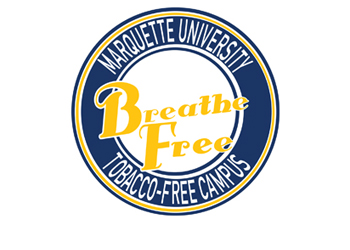Tobacco Free Campus Information and Resources
Why Do We Have a Tobacco Free Policy?
Marquette University is committed to the Jesuit educational principle of cura personalis, or care for the whole person. This includes supporting physical well-being. Therefore, as part of our institutional efforts, we seek to create and maintain an environment that promotes health and healthy behavior for all of our students, faculty, staff and campus visitors. Because tobacco products have well-known health risks associated with their use and secondhand exposure that put all members of the Marquette community at risk, the university has developed a tobacco-free policy.
What Is The Policy?
- Smoking or use of other tobacco products by students, faculty, staff, contractors, vendors, and visitors is prohibited in or on all campus property including all interior spaces on Marquette University’s campus, all outdoor property or grounds controlled and/or maintained by Marquette University, all university-owned or leased vehicles, and all outdoor athletic facilities.
- Tobacco is defined to include any lighted cigarette (clove, bidis, kreteks), cigars, cigarillos, pipes, hookah products, and any other smoking product. This also includes any smokeless, spit or spit less, dissolvable, or inhaled tobacco products; including but not limited to dip, chew, snuff or snus, in any form (orbs, sticks pellets, etc.). Nicotine products not approved by the Food and Drug Administration as a smoking cessation product, such as e-cigarettes, are also prohibited.
- Use of tobacco products is permissible on city sidewalks.
- Religious practices involving the use of tobacco will be exempt from this policy and are to align with the policies of Campus Ministry and Office of Student Development.
- Tobacco and nicotine product advertisements are prohibited in university-sponsored publications.
How Marquette's Health Plan Supports Your Tobacco Cessation Goals:
- For all health plans, preventive/routine counseling for tobacco use is covered in full when seeing an in-network doctor*.
- *Does not cover medical therapy for ongoing tobacco cessation (i.e., hypnotherapy, acupuncture for tobacco cessation, or ongoing counseling with a mental health provider strictly for nicotine dependency).
For persons age 18 years and older, all FDA-approved tobacco cessation products are available at not cost. These include:
- Over-the-counter products, including nicotine patches, gum (Nicorette), and lozenges (Commit), Nicotrol NS nasal spray, and the Nicotrol inhaler. A doctor's prescription is required. Coverage is for a 3-month treatment cycle within a 12-month period.
- Prescription medications, including Zyban and Chantix and any generic alternatives. All coverage is for a 3-month treatment cycle within a 12-month period with the exception of Chantix, which allows for a 6-month treatment cycle within a 12-month period.
- The Employee Assistance Program (EAP) is a benefit for all employees, spouses and dependents. It is 100% confidential and offers in-person or telephone sessions with Master's-level counselors where employees can talk about a variety of concerns including tobacco related issues.



